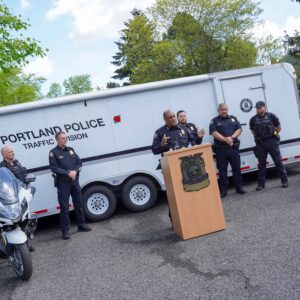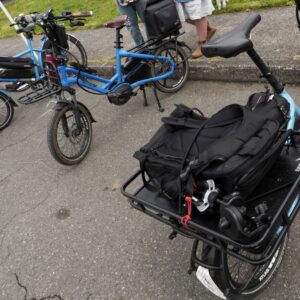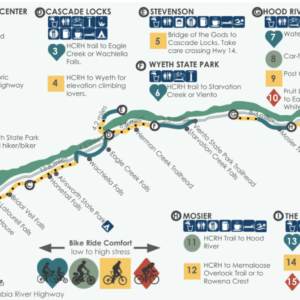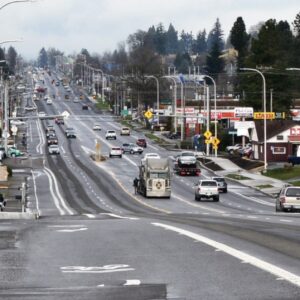
country’s 13th largest metro area and a city planning
to launch a bike sharing system in 2015.
(Photo: Daniel Orth)
By the end of 2015, it’s looking like 21 of the largest 25 U.S. metro areas are likely to have public bike share systems.
The four that won’t: Los Angeles, Detroit, St. Louis and Portland.
Los Angeles, by far the country’s largest holdout, announced this month that it’s on track to launch a system in 2016. Atlanta, Baltimore and Riverside, Calif., have plans to launch in 2015 but haven’t announced more specific dates.
Meanwhile, four other cities started service late last year or will in the next few months: Philadelphia, Pittsburgh, San Diego and Seattle.
St. Louis is still studying the issue. In Detroit, a feasibility study has been completed but that seems to be about it.
And then there’s Portland, which has predicted its system will launch in 2013, 2014, 2015 — and, as of this week, 2016.
For those inclined to continue tracking the city’s predictions, city spokesman Dylan Rivera shared a surprising tidbit in an email this week.
Advertisement
It came in response to a clarifying question I’d asked about Portland Transportation Director Leah Treat’s major goals for 2015, two of which we covered on Tuesday. This is from Rivera’s response:
On her priorities, Leah actually has laid out four top priorities for PBOT this year, including parking policy, Vision Zero, implementation of the two year work plan and bike share. This is how she stated them in a message to staff over the holidays:
“For 2015 my priorities are (1) the implementation of the 2 year work plan; (2) tackling the varied challenges of parking Citywide; (3) announcing a start date for BikeShare; and (4) Vision Zero. There are other priorities that will be on my agenda in the coming months, such as the start-up of the Street Fee (fingers crossed); reforming the taxi-industry and allowing for transportation network companies to operate in the City; identifying and implementing continuous process improvements; focusing on internal organizational development and morale building; and breaking down siloes across the organization, among other things.”
We intend to launch a bike share system in 2016 and will have more to say in the coming months. Nothing more to add today.
This date — 2016, plus the promise of more “in the coming months” — is a change in the city’s message over the last week.
Last Thursday, while preparing an article about Portland’s long-delayed bike share system as a victim of the city’s prolonged search for new transportation revenue, I’d asked Rivera if the city had any new developments on bike sharing, and at that point he’d chosen not to share Treat’s holiday message. He responded only that “the timeline for bike share depends on the industry.”
Not everything about Portland’s delay has been bad. We’ve managed to skip a generation of unreliable software, still being used in New York City and elsewhere. Experimentation with dockless systems continues; it’s still anybody’s guess whether car2go-style floating-fleet systems or hybrids like Grid Bike Share in Phoenix are visible and intuitive enough to get much ridership. If they are, they’ll be cheaper and therefore easier to expand.
With the former Alta Bicycle Share under new corporate leadership, with new financing and rebranded as Motivate, it’s entirely possible that the company’s crippling equipment problems have improved. Portland also has the right to terminate its three-year-old contract with Motivate and pursue a new partner or approach.
Or this could just be the latest unreliable timeline. Whatever happens, we’ll keep tracking it.





April Fool! I don’t believe it.
I’ve said it before and I’ll say it again. Give that bike share money to bike shops and have them offer 24 hour bike rentals that can be picked up or dropped off at any other bike shops. People could rent the bikes for a couple dollars a day.
Helps our bike shop industry, provides a better product, you could reach more parts of the city, do not have to pay for infrastructure or remove parking spaces for stations, creates local jobs. More equitable.
The user would have to find a bike shop where they are and where they are going, that is open for business and not too busy to help them. Most trips don’t start and end near bike shops, and many trips take place outside of bike shops’ 10 am-6 pm hours.
If you expect the user to keep the bike for 24 hours, until bike shops are again open, then he has to lock it up for most of that 24 hours, which defeats the purpose of bike share. If you want to be responsible for a bike all day and night, why not simply ride your own bike?
The point of bike share, at least as all the current successful systems are run, is that you don’t have to haul around a bike all day and worry about it getting stolen. You simply walk to the nearest bike share station, which operate 24/7, undock a bike in 1 minute, ride it to the station nearest your destination, stick it back in the dock, done.
Sunny morning – ride to work. Raining in the afternoon – take a bus or MAX. Going out in the evening – ride to the bar. Finish up late and sozzled – get a ride or take a cab home. Get a bike whenever you want to use one, no need to deal with that bike when you don’t to use it.
My personal example: when I go to NYC for work, I use the bike share instead of taxis. Take a bike near my hotel, leave it near my meeting. Maybe I take another bike to the next meeting, maybe I take the subway or walk, maybe I go to dinner and taxi back to the hotel. If I had to be stuck riding that bike around all day, locking it up everywhere, I’d never use bike share.
That’s not a good plan. Bike share works because you can just lock/dock it near your destination and just forget about it. You don’t need to worry about returning it to a shop or be financially responsible for the bike once it’s docked. Bike shares should also be owned and operated by the city, since they are part of the public transport network. Being owned by bike shops would mean a private system.
What you’re describing is a bike rental service, which we already have. Good luck trying to get all the bike shops to agree to this (and store more bikes in their storage rooms).
you know, that’s not a half-bad idea.
Sounds promising. I’ll continue my cautious optimism.
Wow. Somehow that list of Treat’s sounds like a *very* full plate to me. Just casting a glance back twelve months and then looking back at that list I’m having trouble seeing this list/these lists as even remotely realistic. Or am I missing something?
Reforming the taxi industry?
Start-up of the Street Fee?
Breaking down Siloes?
Breaking down silos was on every large-scale agenda that I ever saw or participated in during 20+ years of civil service at The City That Works. The most expensive failure that I know of was the Enterprise Business System, which, through integrating all financially-related functions (pretty much everything), was supposed to de-silo-ize the organization. $22 million later, the silos were still standing tall in the bizarre cornfields of the City’s form of government. I bless Leah Treat’s optimism.
Wow, that’s a new kind of distinction for Portland.
Are dockless systems actually cheaper? Maybe in initial capital investment (even though I’m not even sure about that, as the bikes need to incorporate more technology), but I think it’s an open question if they’re cheaper in operating costs and in the long term.
More tech?
Really other than material selection (aluminium goes back to around WWII if I remember right – and Carbon Fiber started in 1971), bikes today aren’t really any different than those made 100 years ago. Dyno hubs invented in the 1930’s, derailleurs before that even, IGH 1903, odometers go back to the late 1800’s. Even the frame geometries haven’t changed much if at all in all that time. The only real difference is marketing and that new bike smell.
As for other stuff like GPS tracking and such, that tech can be designed to fit in just about any part of a bicycle without disturbing the functionality at all. And if designed right from the get go, tech updates would likely be little more than software updates anyway. Besides most the point of sale tech would be better tied up in docks and locks, which has nothing to do with the bicycle choice.
Don’t dockless bikes need GPS and a lock, where docking bikes wouldn’t? Even at $50/ bike, the cost could add up.
Disc brakes, shifters at your finger tips, more speeds than most know what to do with, a ride that doesn’t feel like you’re on a bucking bronco, clip less pedals.
Sure some of the materials and technologies have been around a while, but you can’t say there haven’t been SOME innovations.
But I agree that dockless bikes is really not much of a selling point for me.
“With the former Alta Bicycle Share under new corporate leadership, with new financing and rebranded as Motivate, it’s entirely possible that the company’s crippling equipment problems have improved.”
Remember, Alta is just the operator. Those crippling equipment problems were due to the supplier, which was also sold to new ownership last year. Alta made the mistake of partnering with them, to the point that most people couldnt distinguish the difference between the two companies. There was nothing stopping Alta, for example, from using bike share hardware and bikes from a different provider, such as Bcycle or one of half a dozen other companies.
Of course, Alta had their own massive array of problems, strictly on the operational side. Some of the hardware problems in NYC were due to poor maintenance, which is all on them.
Portland made the serious mistake of picking two companies that were obviously in peril, one as the operator, and one as the hardware supplier.
Im sure the local buddy-buddy connections had nothing to do with that decision.
As I understand it, Alta had an exclusive contract to sell/install PBSC equipment outside Canada, and I assume there were some binding conditions in the other direction, too … so though Alta could probably have found a way to dump PBSC at some point before its bankruptcy, that would have been a pretty huge decision.
That said, good points.
That can’t fully be true, because the London system uses Bixi bikes but is not operated by Alta, as is Minneapolis. But yes, it’s a good point that there’s a lot behind the scenes with the contracts.
Also, I cannot tell what the hell is going on in Miami. Decobikes operated Miami Beach, I believe with their own hardware and bikes, and expanded to Miami where it was rebanded as “Citibike by Decobike”. The two systems have one subscription and website, but they use different bikes and stations, which makes me wonder if downtown Miami is using Bixi?
Yeah, Cycle Hire and Nice Ride both launched before Alta bought those rights. They’re exceptions. No idea about Miami – I thought both were locally branded B-Line systems.
Puget Sound Bike Share (Seattle’s program) is operated by Alta with the hw/sw from 8D. My understanding is that Motivate has a ‘strategic alliance’ with 8D and no longer has any contractual bindings with PBSC (this statement is telling: http://www.motivateco.com/news/id/80). Going forward, I expect all the dock-based systems that Motivate operates will be 8D. That said, I don’t think there’s any kind of exclusivity with 8D. If Portland wants a dockless system, I’d expect they will get one – with Movitate operating it (similar to the SoBi/Motivate deal in place in Providence).
Still seems to me that bike share and Trimet are the perfect compliment to each other.
Bikes stations at max stops and more popular bus stops, bike racks on the back of buses for redistribution between stations, employees riding bikes and taking buses to restock the bikes from the racks on the back, passes bought on bus or through updates to the max fare ticket POS system.
After all it could make more passenger room on the max and buses. Do you wait 10 minutes for that bus to take a few blocks over the bridge, or to the other side of Downtown or jump on that bike sitting right there and get to where your going in that time you normally would have waited for the Max and or bus?
Also this would service both the local and tourist population better instead of the tourist population that most bike shares cater to.
If bike share really is a good compliment to public transport, then why should it be separate from public transportation?
Guess you meant ‘. . .perfect complement. . .’ OK, peevish, a little. Yes to most of that, but bus drivers will _hate_ it. And also: tail swing.
It long has seemed to me that bicycle sharing is a difficult, impossible, expensive, counter-productive derangement to get more ignorant urbanites on two wheels.
First, the machines themselves are lowest-common denominator horrible.
Second, the system requires unconscionable quantities of labor and motor vehicles to be continually “rebalanced,” maintained, administered.
Third, a bicycle is a very singular, personal, individual thing that when properly chosen, ridden, maintained rewards its possessor with life, liberty, pursuit of happiness.
For the same amount of money, not spent on complex systems, equipment, governmental organizations, how many Bromptons could be supplied to worthy would-be cyclists in Portland? Bromptons do not require bike racks or even locks; they can go into one’s place of employment, taken along on public transport, reside inside one’s warm dry home of nights.
I’d like to compare capital costs of a bike sharing system compared to capital costs of an equal number of Bromptons. Then add the labor, operation of motor vehicles, administration to the capital costs of the sharing system.
Bicycle sharing is a solution looking for a problem, at least in Portland, Oregon. In D. C., things are different, no doubt, but D. C., as Dave Barry noted, is inhabited almost entirely by ex-high school student-body presidents. New York, Miami, suffer their own peculiar delusions.
Bicycle sharing ought to, and deserves to, fail here.
Have you ever used bike share?
I wondered the same thing about Kiel Johnson’s comment. Some people just don’t like bike share for various reasons but then, a lot of people haven’t actually used it. For me, it’s a different thing altogether from my own bike (or a rental, which is almost like my own bike), and both have things about them that I like.
Vision Zero would have to include fixing Barbur, right?
Sounds like a showdown with ODOT to me.
I bet ODOT will punt, and give Barbur to PBOT before they consent to anything like Vision Zero.
The option of pod-less or station-less bike share bikes (ala Call-a-Bike, etc.) makes implementation easier (no stations to install, power and permit) but it also removes some of the income stream: loss of advert or sponsorship space (two 3ft x 4 ft panel on kiosk).
The placement and permitting of station pods will take a lot of staff time at CoP during the run up…also dependant on the amount of neighbourhood and business input on locations.
Blah, blah, blah. I’ll believe it the day after it launches, and I don’t want to hear about it again unless there is real news, like a sponsorship announcement. Someone putting it on a to-do list for 2015 isn’t really news, is it?
Not really. That’s why we combined it with this broader “state of bike sharing” story and emphasized the thing that is actually new: that Portland is now going to be one of the last few big-ish cities in the country to offer a system, if it does.
It is depressing and embarrassing for Portland to be in this position, in the company of St. Louis, Detroit, and car-hell LA. And it’s incredibly disheartening to see so much anti-Bikeshare sentiment on *this* forum. Don’t you folks get it? Bike Share will increase bike usage, period. Bike share will get visitors and residents out of cars and onto bikes, building a yet-bigger constituency for bike infrastructure & safety. People who will use Bikeshare are NOT like you–they’re not obsessed with ultra-high quality, they’re not bike fiends. They just want to get from place to place, easily, and not in a car. The city needs to help them. We should all be supporting this, as another important *piece* of the PUBLIC transportation infrastructure.